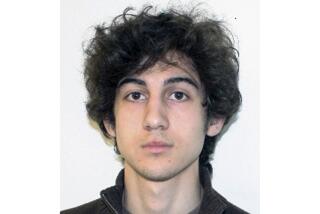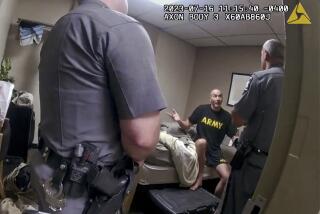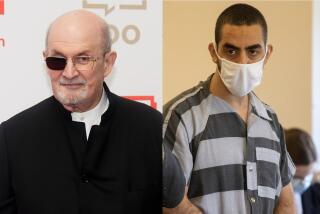Insanity defense might be used for Norway attacks suspect
The attorney for Norwegian terrorism suspect Anders Behring Breivik described his client Tuesday as emotionally cold, probably insane and hopped up on drugs during the twin attacks last week that killed at least 76 people.
The comments offered the first glimpse into a possible legal defense strategy in what is expected to be Norway’s most explosive criminal trial since the prosecution of accused Nazi collaborators after World War II.
Geir Lippestad, a public defender who was handpicked by Breivik, also said the 32-year-old extremist — now held in solitary confinement — is unsure how many people he killed and expressed surprise that Norwegian police took so long to stop his attack.
“This whole case has indicated that he’s insane,” Lippestad told reporters in Oslo, saying Breivik believes he is leading an anti-Muslim revolution to overturn Western governments and that the victims from his downtown Oslo bombing and Utoya Island shooting rampage were casualties of war.
“He says he is sorry that he had to do this, but it was necessary to start a revolution in the Western world,” Lippestad said. “He believes he is in a war.”
Legal experts said Lippestad appeared to be laying the foundation for an insanity plea, particularly since authorities say Breivik has confessed to both attacks.
“I don’t think there are any other possibilities for this defendant,” said University of Oslo law professor Stale Eskeland.
It is expected that Breivik will first be examined by court-appointed psychiatrists to determine whether he is mentally fit to stand trial. If deemed unfit, he would be sent to an institution for an indefinite time — possibly the rest of his life — until doctors judge him to be stable.
If psychiatrists decide Breivik is fit to stand trial, his attorney could still argue that he is not guilty by reason of temporary insanity. But legal experts predicted that such a strategy would be difficult because the attacks appeared to be so well planned and methodically executed.
Also the defendant may object to such a legal defense. In his 1,500-page manifesto, Breivik argues that violence is justified as a way to draw attention to his anti-Islamic, anti-immigration ideology. He repeatedly predicts in his text that he would be labeled insane after carrying out an attack.
On Monday, Breivik had hoped to dress in uniform and address the world through the international media during his first court hearing, but a judge ruled that the proceedings be held behind closed doors.
“He’s looking to spread his manifesto and his ideology,” Lippestad said. But the attorney said he had no plans to build his defense around Breivik’s controversial views, saying, “I don’t think they’re of any importance to this case.”
He added that if Breivik objects to his legal strategy, he is free to request another attorney.
Lippestad confirmed that his client told police about two other alleged terrorist cells operating in Norway and others outside the country, but said Breivik had provided no other details about the cells.
Lippestad declined to specify what drugs his client allegedly took before the attack. In his manifesto, Breivik writes about using energy-boosting workout supplements and steroids.
According to Lippestad, Breivik expected that police would kill or apprehend him before he was able to reach the ruling Labor Party’s youth retreat on Utoya Island. The comment is likely to increase pressure on Norwegian police, who have been criticized in the media for taking at least an hour to reach the lake island retreat. By then, the gunman had systematically hunted down and killed 68 people, mostly youths. An additional eight people died in the Oslo car bombing.
Police officials defended their response, saying they lack the kind of helicopter capacity that would have enabled faster intervention. Norwegian Justice Minister Knut Storberget said Tuesday that police did a “magnificent job” and called criticisms inappropriate.
In a sign that police may be skeptical about Breivik’s claim of other terrorist cells in Norway, authorities said Tuesday that they were scaling back some of the security measures put in place after the Friday attacks, and were, for example, going back to using unarmed police officers.
“We can’t be led by fear,” said Oslo Police Chief of Staff Johan Fredriksen. “We have no information about threats at the moment.”
Police also began the grim task of formally releasing the identities of those killed, naming three people who died in the bombing and a fourth slain on the island.
The high death toll in the attacks has led some Norwegians to question the adequacy of the nation’s penal system. Under current law, the maximum sentence for most crimes is 21 years. Norway has no death penalty or life imprisonment. Recently the legislature approved a 30-year sentence for crimes against humanity, and officials are considering charging Breivik under that statute.
Another option that could be used to extend Breivik’s incarceration is a so-called custody provision, under which the court does not impose the usual imprisonment, but instead orders a convicted criminal into a special kind of safekeeping. Near the end of the imposed sentence, the government can petition the court to extend the custody indefinitely, in five-year increments, if it can show that the criminal remains a threat.
The rarely used provision is typically imposed against repeat offenders, such as rapists, pedophiles and arsonists, according to University of Oslo law professor Ulf Stridbeck.
“It’s used when it’s important to protect the society,” Stridbeck said. “That would seem to fit in this case.”
Photos: Anders Behring Breivik
More to Read
Start your day right
Sign up for Essential California for news, features and recommendations from the L.A. Times and beyond in your inbox six days a week.
You may occasionally receive promotional content from the Los Angeles Times.






